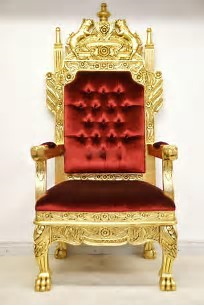David faced crisis when one of his sons, Absalom decided to claim his father's crown without Royal Endorsement. As a result, David was driven out of his throne 40 years after assuming that position.
When a King is driven from his throne, he rarely returns. David may be the only King to suffer a rebellion severe enough to drive him from the capital and still return by God's Will. Other Kings such as Josiah, Athaliah etc. were never able to hold power as comfortably as they once did.
Trouble with Absalom began a few chapters back in 2 Samuel Chapter 13, when Amnon raped Tamar, Absalom’s sister his own half-sister and as a result, Absalom murdered Amnon. Even after Absalom committed murder, he received no punishment. He was not banished when was there any sentence waiting to take effect if he ever returned as he fled.
Joab, King David’s the cousin, realised early that David was hesitant to take decisive action against his own children. As a result Joab hired a Wise woman to preach reconciliation or at least move the king to take a decision rather than leave Absalom’s fate hanging. David decided to move for reconciliation, he invited Absalom back to Jerusalem but refused to see him for 2 years.
Absalom grew truculent and attempted to order Joab to appear before him. Naturally, Joab ignored the summons and Absalom decided to punish Joab by burning his fields. Joab acquiesced by taking Absalom's request to David, who once again fully forgave Absalom with no repercussions for burning crops or arson against the Commander of the Israelite Army. The King’s forgiveness secured, Absalom moved further to bolster his image amongst the populace. Normally, a dissenter who engaged in such wiles would be dragged away in an undemocratic government. But neither David nor his men lifted a hand to stop Absalom’s power-grab. Absalom also began to undermine the King’s duties by presenting himself to solve the people’s disputes. What would have been an admirable action by the Chosen heir of David was turned into a crude power grab. Absalom gradually gathered supporters to himself. Previously returning from exile, the funds secured for these expenses could only have come from one source: David's Palace.
Almost 40 years after David was declared King, a time for rejoicing; Absalom asks for permission to go to Hebron and keep a vow of Thanksgiving for returning to Jerusalem. David, oblivious to the fact that Absalom has been in Jerusalem for 3 years, allows Absalom to leave his watch. As Absalom steps out of Jerusalem, declared himself King of Israel from Hebron. The Bible notes that Absalom pulled 200 ignorant men from Jerusalem along with himself and even sent for one of David’s most valuable, but disgruntled advisers: Ahithophel.
Ahithophel is most well-known for the prayer of David against him; “turn the counsel of Ahithophel into foolishness.” {2 Samuel 15:31}. Ahithophel on the other hand may not have deserted David out of ambition, but out of disillusionment. Ahithophel is related to Bathsheba: mother of Solomon. Anger at the blatant adultery and quick marriage after her husband’s death may be the reason why Ahithophel cared very little about King David’s dethronment. And Absalom’s little rebellion struck fear into the heart of David who fled the Stronghold of Jerusalem.
As David fled from Jerusalem, fear began to cloud his mind, he started dropping allies and turning his advisors and priests into spies. He recognized that the fault was his and offered everyone the chance of neutrality, but they all refused and by God’s grace none of them came to any harm. But Zadok and Abiathar were priests; they serviced the temple and were consecrated to God. David ordered them to report any and all information to him. Along with Hushai, David seemingly ensured that he would be able to know the most important events and decisions going on in the city. Yet, it was only divine intervention that someone, as wise as Ahithophel didn’t see through the plan. Otherwise David would have met a very sticky end. As for David, when he left Jerusalem he began to suffer swindling and curses, both of which came from the House of Saul. Ziba deceived him by bringing gifts as a bribe and collected almost all the remaining land of Saul, Shimei insulted and cursed David. No doubt in glee that the main opponent of Saul was being brought down by another rebel.
Back in Jerusalem, Absalom began to consolidate into his position as King. He took over his father’s harem and prepared to end David reign. He and his court had Ahithophel’s advice, which was to go after David with 12,000 men and quickly end the former king of Israel. Hushai's advice was for Absalom to consolidate his army by uniting his supporters under a common goal. This idea would
- Appeal to Absalom’s ego as leading a great victory.
- Defeat Ahithophel’s counsel of quickly ending the opposition.
- Give David time to prepare and form his forces.
Ahithophel’s counsel was, once again through God, defeated and he ended his own life in shame. Without him, Absalom was forced to go to battle resting only on an ‘enemy's advice’. David’s little spy ring was likewise almost defeated when the sons of Zadok and Abiathar were spotted. God's grace again; spared them and their fathers from Absalom’s hand and David was informed. Even outside of Jerusalem, people began to donate their supplies to David so that he and his men may not starve. As the rebellion came to a peak, David was left to rely on Joab once again, and his commander set out with two others. Joab and the army plainly told David that as King, he was the most valuable target so he must stay behind while they went to fight for him. David quickly agreed to stay in the safest position while his men went forth, but he charged his men that in attacking the rebel army they should not to in anyway harm the enemy commander Absalom. Despite the people’s conflicting orders they delivered a victory for David and some even complied with his orders concerning Absalom. When Joab heard the location of the Rebel he moved forward and killed Absalom and immediately ended the bloodshed among the Israelites. On returning, David’s welcome for the troops who risked their lives for him was to publicly shame them by crying over their victory.
The thousands of troops returned to a King who refused to appreciate their work and ignored their sacrifices. Joab, being close to David, chided him to cease weeping and congratulate the troops for their victory.
David’s action in the form of punishment was to demote Joab to serve under the Rebel general he had just defeated.
Time and time again David was saved by God’s grace and the competency of other men. Yet when he returned to Jerusalem and another rebel arose, Joab’s response was incredibly quick. And he wasted little time in squashing the every new rebel to David’s throne. Up to the point where he reassigned the task of securing the kingdom to Abishai when Amasa took 3 days...
All in all, the story of Absalom and David displayed many warning signs;
- Pay Attention: David was far too oblivious to many warning signs in Absalom’s behaviour. From undermining the King’s duties to punishing the King’s generals, Absalom clearly had his mind on something greater than being David’s son.
- Act quickly: David could have stopped the rebellion at over 4 different points in time. Yet he didn’t, and that lack of action drove him from his throne. Even before Absalom’s rebellion, if David had decisively handled Amnon's rape properly, there would have been no vengeful murders among his sons.
- Be Decisive: David could easily have averted a great number of troubles if he had simply announced and confirmed an heir. Instead, he allowed his family to roll around and only shut down claimants after they had made a power play.
He tried to order his army to put their lives in the enemy’s hands and would have spared Absalom had Joab not intervened. An old saying is that, “The Chains of Habits are generally too small to be seen until they are too big to be broken”. David became too lax too deal with anything from his own troubles till the point where he was driven out of the throne given to him by God.
- Gratitude and Appreciation: David shamed his own men and demoted Joab when Absalom was executed for rebellion. No matter his personal feelings, the troops of Israel were men just like him. Yet when most armies would celebrate, they stealthily crept home for the heinous crime of victory. David selfishly put his personal feelings above the lives of thousands of men who almost died for him and the hundreds who did die. This is the exact opposite of a good leader.
In conclusion, the story of Absalom exposed many of David's faults. The anointed king of Israel was for one no longer the warrior he was and from the beginning of Amnon’s misbehaviour to Absalom’s death, it is easy to see a running thread of leniency and the indecisiveness. Perhaps David could have averted being stoned by Shimei, and swindled by Ziba; perhaps hundreds of men wouldn’t have died in the Forest of Ephraim if David simply had the mind-set to nip every the challenge in the bud.
David and Absalom 2 Sam 15-20












